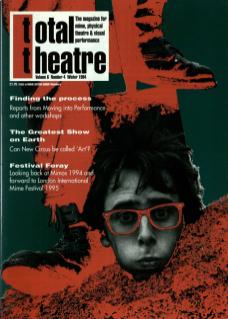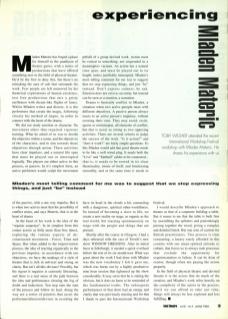Mladen Materic has forged a place for himself in the pantheon of theatre gurus, with a series of productions that have offered something new in the field of physical theatre. He'd be the first to deny this, but there's no mistaking the aura of cult that surrounds his work. Few people are left unmoved by his theatrical explorations of human existence, text-free productions that mix a gritty earthiness with dream-like flights of fancy, Whilst Mladen writes and directs, it is the performers that create the magic, following closely his method of impro in order to connect with the heart of the drama.
We did not study emotion or character. No movement ethos that required vigorous training. What he asked of us was to decide the objective within a scene, and the objectives of the characters, and to aim towards those objectives through action. These activities have clear impulses, and a natural life span that must be played out or interrupted logically. The players are either active in this process, or passive. In it's simplest form, an active performer would sculpt the movement of the passive, with a one-way impulse. But it is when two actives meet that the possibility of conflict arises, and, says Materic, that is at the heart of drama.
At the heart of his work is the idea of the ‘organic sequence’. In its simplest form this comes across as little more than free dance, exploring the various aspects of deconstructed movement – Force, Time and Space. But when added to the improvisation process, and the idea of reacting organically to the previous impulse, in accordance with our objectives, we have the makings of a style of theatre that is rich in sub-text and strong on clarity. But isn't all this obvious? Possibly, but the rigour it requires is curiously liberating, and there is a real sense of the path between the idea and performance clearing the fog of doubt and indecision. You step onto the start of the process and follow its lead. Along the way are a series of pointers that assist the performer/director/deviser in avoiding the pitfalls of a group devised work. Action must be rooted in something, not suspended in a meaningless vacuum. An action has a natural time span, and must be played out to its length, unless justifiably interrupted. Mladen's most telling comment for me was to suggest that we stop expressing things, and just ‘be’ instead. Don't express sadness, be sad. Emotion does not exist as an entity, but instead can be seen as a reaction, a sensation.
Drama is basically conflict to Mladen, a situation when two active people meet with different objectives. A passive person always reacts to an active person's impulses, without creating their own. They may avoid, resist, ignore or misinterpret, all elements of conflict, but that is never as strong as two opposing activities. There are several criteria to judge the success of the work. ‘Is it action?’ and ‘does it work?’ are fairly simple questions. To this Mladen would add that good theatre needs to be like a well wired plug. It needs both the ‘Live’ and ‘Earthed’ cables to be connected... that is, it needs to be rooted in its clear theatricality, aware of itself, and functioning smoothly, and at the same time it needs to have its head in the clouds a bit, connecting with a dangerous, spiritual other worldliness. So instead of becoming a slave to life, we create a new reality on stage, as organic as the real world, but reacting spontaneously on stage with the people and things that are present.
Shortly after the course in Glasgow, I had a day’s rehearsal with the cast of Trestle's new show Window Dressing. After its initial burst at Edinburgh, it needed a quick overhaul before the rest of its six-month tour. What was great about the work I had done with Mladen was the new vocabulary I felt it gave me, which was borne out by a highly productive nine-hour session that tightened up the show considerably. It may seem that he is stating the obvious, but it does no harm to be reminded of the fundamental truths. The subsequent performances of that show had an energy and clarity that was previously missing and for that I thank in part the International Workshop Festival.
I would describe Mladen's approach to theatre as that of a carpenter building a table. But it seems to me that the table is built first by assembling the splinters and painstakingly piecing together the wood, giving a complex and detailed finish. But one note of caution for British practitioners. This process is time consuming, a luxury rarely afforded in this country with our mean-spirited attitude to culture, that forces us to always rush processes that exclude the opportunity for experimentation or failure. It can be done of course, though often not while paying the actors properly.
In the field of physical theatre and devised theatre it is the actors that do much of the creation, and Mladen's work relies heavily on the complicity of the actors in the process. Until we can afford to take our time, things will always be less explored and less fulfilling.

